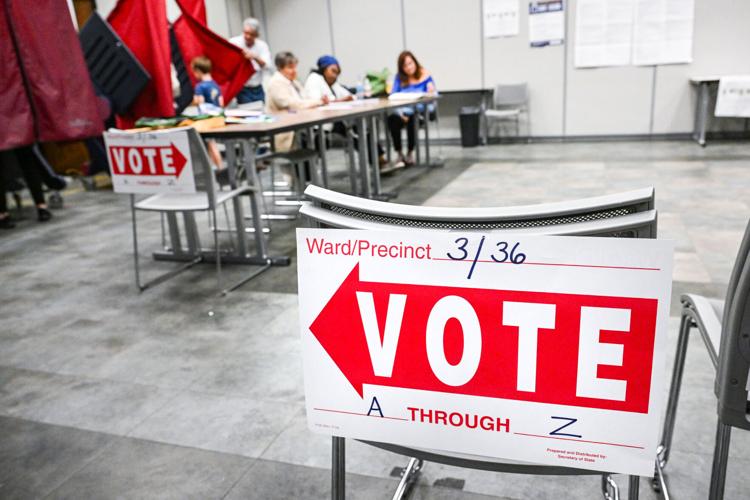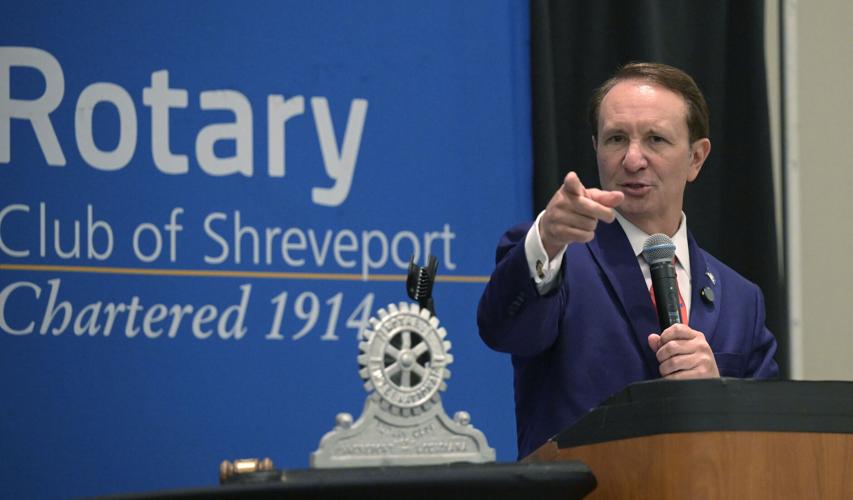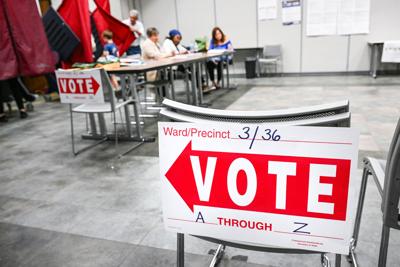Louisiana voters roundly on Saturday's ballot that Gov. Jeff Landry had supported, including a complex, far-reaching overhaul of the state constitution's section on revenue and finance. Columnists Stephanie Grace, Quin Hillyer and Will Sutton compared notes on what message they think the voters meant to send. This conversation has been edited for length and clarity.
���ܳٳٴDz�:��This seems like a really huge moment in Louisiana politics. Do you recall a vote on anything else in Louisiana that was so lopsided?
�Ұ�������:��There was an election in Orleans Parish in 2023 where 91% rejected a Sheriff’s Office millage. There was the creation of regional levee authorities after Katrina, which got 81% support statewide. Those are bigger numbers than we had this week, but still, we had 63-66% voting against the governor.
The common thread, to me, is trust in government. There was a lack of trust in these proposals. It came from a few different places. It was not hard for Democrats to capitalize on, because they're angry anyway. They're angry at Landry, they're angry at Donald Trump. They feel like their government is doing all kinds of things that they can't control. This was something they could weigh in on, and boy, did they.

Columnist Stephanie Grace
I feel like Amendments 2 and 3 were really the ones that people talked about and were strongly opposed to, but the campaign to vote no on all four offered a powerful, easy message.
But the opposition wasn’t only from Democrats, so let's talk about that.
�ᾱ��������:��I agree that most of this was driven by the two more high-profile amendments, juvenile justice and the tax overhaul. Voters, especially when they're given this little time — and they really had almost no time to digest this — they tend to see what the high-profile things are and then lump everything together.
And the one was just a flat-out bad idea. I mean, it was to give legislators the ability to try juveniles as adults, without letting the public weigh in on what crimes should count. Most people do not think that children should be treated as full adults except in extreme situations, and you ended up with a ton of opposition.
Grace: And the backdrop is Landry and the Legislature had already moved in that direction in the past year without voters having a chance to weigh in,

Quin Hillyer
�ᾱ��������:��And now they wanted to go even further, and that struck a lot of people, not just liberals and Democrats, as really sort of scary. I mean, you've got a lot of conservatives who have just spent the last several years saying, “don't treat children as adults when it comes to books and libraries, when it comes to transgender issues, when it comes to all sorts of social issues.” And you're going to turn around and say, “treat them as adults for a crime that's less than a murder or aggravated rape;” that flies against what most people think. So that was a hard no.
And a lot of people were hard no on the because it was too complicated, and because if you're against any one part you're likely to be against the whole thing. And if you're a hard no on two of them, it's so easy to be a hard no on all four amendments, because you're thinking, “We just don't trust these guys.”
Grace: They included sweeteners and really promoted them — the teacher pay raise, whether you agree it was really a pay raise or not — and I think people took it as “look at that, but don't look at the rest.” I really do think people support paying teachers at least the extra $2,000 they've gotten the last couple of years, let alone more.

Times-Picayune columnist Will Sutton on Thursday, September 12, 2019.
Sutton: And along those lines, on Amendment 3, juveniles are now treated as adults only in the most heinous crimes, and they're in the constitution. So then the question is: Well, what else would you want to add? There was no answer to that, and I think that was a big problem. I don't care what party or philosophy you have, you want to know what's your alternative.
And with Amendment 2, there was also a faith component. The Rev. Tony Spell focused on taking protection against property taxes for religious institutions out of the constitution, and it resonated with folks from various faiths and backgrounds.
Grace: And that group included parts of Jeff Landry's conservative base, and they ended up in the vote-no-on-everything space too — which, again, was an easy place to go.
Also, none of this was about national politics — even though there are national Democrats saying it’s part of a trend — but the context does matter. Landry has moved so fast on so much, and Trump is moving so fast on so much. And there just really is this environment of: Can we slow down and talk about whether we are really making good decisions?
Hillyer: And there is a very healthy visceral antagonism in the American public against too much concentration of power, and against when somebody like Landry, all across the board, is grabbing power. He's grabbing power with levee boards. He tried to rig a system to completely rewrite the state constitution. He failed at that, but everywhere you look, he is trying to consolidate power. And once that idea gets out there, people are going to say no.
Grace: So far, the Legislature has mostly gone along with Landry. I wonder if this result changes that to some extent, if it gives legislators a feeling that that's not necessarily what their voters want, and maybe empowers them.
Sutton: I think it absolutely will, as they see the statewide result, but then look at their districts, with so few parishes voting yes. How can you not look at that and say, “Whoa, OK, I can still be with (the governor), but to what degree?”
Hillyer: I think on both the state and the national levels, this might send a message to legislators to have some backbone and realize that they are not elected to follow whatever the executive says. And not to over-nationalize this, but that's a lesson that national Republicans are also going to learn a year and a half from now after refusing to use the authority that their constituents gave them to use their own independent judgment rather than just follow along like pathetic bleating sheep.
Grace: The map was so striking because parishes of all different political stripes opposed the amendments.
Sutton: And that's one of the reasons why Democrats have good reason to look at this as a big win, but I think it'd be too much to consider this an anti-MAGA vote. This was a different coalition of voters saying no, too much, too far, too fast.
Hillyer: I think something needs to be said here. Jeff Landry's response to this was despicable. To say that just because people disagreed with him on this means that this is, quote, “a state that is conditioned for failure.” It's not true, and it's obnoxious, and it is assuming that because you want it as governor, that what you want is the only thing that matters.
Grace: When has insulting voters ever been a smart thing for a politician to do? When have voters ever said, “Oh, you’re right, I am stupid. You're smart."

Gov. Jeff Landry speaks Tuesday, March 25, 2025, during a meeting of the Rotary Club of Shreveport at Shreveport Convention Center in Shreveport, La.
There's criticism that amendment supporters were caught flat-footed by the strong opposition from multiple corners. The groups on the left were very coordinated and out there very early, and the group on the right that we talked about was very vocal. But also, just anecdotally, I knew people who were engaged and trying to figure out how to vote, and there was so much confusion, even from them, as to what Amendment 2 would do. I heard people say that they thought the 5% sales tax was in there. It's not; that already happened. The flat income tax already happened. So, Landry sold this as part of this big tax reform package, but some of the things that people opposed weren’t even in there.
Hillyer: Let me jump in here real quick and say that raising the sales tax in an already high sales tax state was both substantively and politically a very bad thing to do. It is a regressive tax, and it is a tax that is also pretty bad from a standpoint of economic development, and I think it's a very unpopular tax. And I think that that definitely played a role here, because people were responding to that hike in the sales tax.
I bet a lot of people would have voted for Amendment 1 if they separated that into two, because there were two different parts of that amendment involving courts that had nothing to do with each other. Each of them might pass individually. Amendment 4, which was the one on timing requirements for fulfilling Supreme Court vacancies — it's a very minor thing. Given another chance, it might pass.
�Ұ�������:��Again, I think the trust issue came into play. You heard conversation about, "Wait, are they going to do something to try to rig Supreme Court elections?" And it's hard to understand how they could, but I think there was that feeling, especially after Landry pushed the Legislature to create party primaries for the Supreme Court.
�ᾱ��������:��And then on Amendment 2, unless two items have to go together operationally to make something work, then you should separate them. For instance, that sort of back door-way to get rid of the inventory taxes; no reason why that couldn't pass on its own. You’d have to put that with a provision that provided another revenue source, but you separate it from all the rest of the tax stuff, and that could pass individually, right? People want to understand what they're voting for in digestible chunks.
Grace: And there is an inherent contradiction in Amendment 2, in that the argument was to free up legislators to give them more maneuverability by taking money out of trust funds that voters adopted and in many cases liked. There’s an argument for that, but at the same time, there were provisions that gave them less flexibility. The cap on income tax was actually higher than the current rate, but it would mean legislators can't raise income tax in the future if, say, they decide to lower sales tax. And also the hard spending cap. Probably those were put in to get very conservative support in the Legislature, but they created a contradiction.
Let's talk about what happened in some of the local referenda. All over the state, measures involving taxes lost.
�ᾱ��������:��Well, there's a library tax in St. Tammany that passed.
Grace: That did pass. People like libraries, but they don't seem to like much else. The city charter in St George went down. When I looked at the results on Saturday night, my thought was that the voters are really cranky.
Will, you brought this up, but let’s talk about it a bit more. What does this mean for Democrats in this state?

Louisiana Democratic Party Chairman Randal Gaines welcomes everyone to a get out the vote rally at the Louisiana Democratic Party head quarters on Friday, November 1, 2024 in Baton Rouge, Louisiana.
Sutton: Randal Gaines, the state party chair, just hired a new executive director, and he's really good with fundraising and building staff and working through different affinity groups. I think this is something where the timing is so right for them to latch on to, to tell folks: See what we can do.
Grace: Because the party has been viewed as very ineffective in recent years. Like tragically ineffective.
Sutton: Right. And they've got an opportunity here to use this to establish some infrastructure to attract more people to party engagement, and to look ahead and figure out if what happened with this election can translate into people running for office.
Grace: Quin, do you feel like this says anything about the partisan mix in the state?
Hillyer: I think it's easy to overgeneralize about what the results might mean for the bigger picture. But that said, if I were the Republicans, I would be a little nervous now, and I would start to think maybe I need to start listening not just to my activist base, but to people who are either more in the middle or who are not as political. All of this, too much, too soon, too big and too arrogant does not play well.











